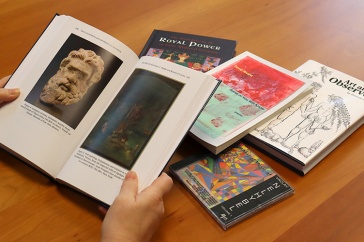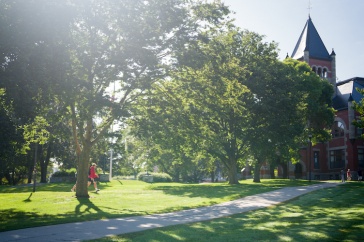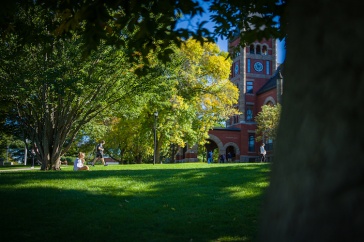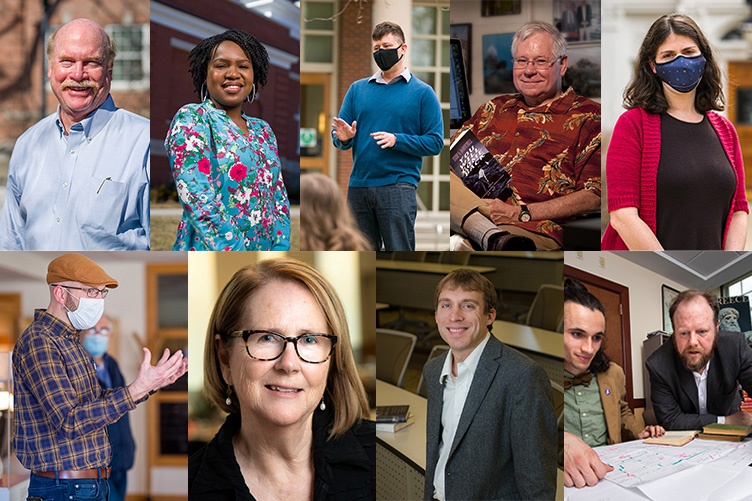
The University of New Hampshire annually selects a small number of outstanding faculty for special recognition of achievement. This year, nine faculty members from the College of Liberal Arts are honored for their excellence.
Kabria Baumgartner Todd DeMitchell Harriet Fertik Alex Holznienkemper Michael Leese Gregory McMahon Scott Smith Jason Sokol Charlotte Witt
Kabria Baumgartner, 2020 Outstanding Assistant Professor

Assistant professor of American studies and English Kabria Baumgartner does it all. She is the highly lauded author of “In Pursuit of Knowledge,” an exploration of educational activitism among Black women in antebellum America, which won two prestigious awards in 2020. She also is a public intellectual who is much sought after to provide not only new insights into African American history and culture, but also her expertise in translating that knowledge for non-academic audiences. On top of all that, she won a $100,000 grant from the National Parks Service to develop a public humanities project on African American life in Essex County, Massachusetts.
Professor Baumgartner’s scholarly excellence is matched by her stellar work in the classroom. Professor Baumgartner is an impressively innovative and hands-on teacher, who brings her research into lectures and lively class discussions with her students.
In all of her many endeavors, Professor Baumgartner’s extraordinary intellectual generosity and dedication to social justice come to the fore. Through the African American role models that she has recovered from the past, she not only urges us to recognize the long history of both gender and racial educational disparity, but she also inspires us to create more equitable access to education today.
Todd DeMitchell, 2020 Graduate Faculty Mentor Award

Professor of education Todd DeMitchell has a long and distinguished history as a mentor and scholar at UNH. During his 30-year career, he has advised more than 80 masters and doctoral students. He is a past recipient of the UNH Distinguished Professor Award, he has worked tirelessly in graduate education to provide exemplary service to students.
Part of what makes Professor DeMitchell special is his deep commitment to practicing the ethics he studies and teaches. This is evidenced most clearly in his collaborations with graduate students. He treats his doctoral students with respect and conveys a sincere interest in their success. Consistent comments from his graduate advisees reflect his “compassionate yet firm” approach to both teaching and mentoring.
Professor DeMitchell gives generously of his time to both his formal advisees and to many graduate students seeking advice about research in educational leadership. Known in the graduate student community as a reliable, generous, astute faculty member who is dedicated to justice, ethics, the law and education, his presence has had lasting results: almost all of his graduate students are currently employed in fields related to their degrees.
In addition to being an outstanding mentor and role model, Professor DeMitchell brings two decades of K-12 teaching experience to his work, and his courses are in high demand with students, educators and administrators alike. It’s a testament to DeMitchell’s influence and impact to note that just about every school administrator in New Hampshire has taken a course or worked with him at some point in their career, and it is more than fitting to recognize him with the university’s 2020 Graduate Faculty Mentor Award.
Harriet Fertik, 2020 COLA Excellence in Teaching Award

If you are familiar with improvisational theatre, you might have heard about “yes, and.” The idea is that you want to avoid saying something to shut down the scene, so instead of saying “no,” you say “yes, and” — you build on what your partner is giving you.
Harriet Fertik says she thinks about “yes, and” a lot when she is teaching. Her aim is to build a conversation that includes as many students as possible that can be sustained throughout the semester. An associate professor of classics, Professor Fertik has been saying “yes, and” for the past seven years at UNH — in Latin and Greek language courses, in Roman history and culture courses, and in a host of experiences she undertakes with students, such as discussing architecture in the dusty streets of Pompeii through study abroad or dissecting Black Odyssey on the way back from Trinity Rep in Providence (Black classicism being among her scholarly specializations).
Her students say she goes “above and beyond” and “bends over backwards” to support them. One was “stunned” at the lengths Professor Fertik went to find her an internship. Another at the fully funded UT Austin doctoral spot she helped him earn. Professor Fertik is highly intelligent, broadly knowledgeable and deeply passionate about teaching, her colleagues note — always concerned with helping students see that classics have much to say about 21st century life.
Alex Holznienkemper, 2020 COLA Excellence in Teaching Award

Who knew we had a YouTube sensation right here at UNH? German lecturer Alex Holznienkemper’s 23-minute video on German adjective endings has been viewed more than 97,000 times on the platform. He even took a bit of a star turn at one point, when adoring Florida State students who had benefited from the instruction spotted him on a street in Germany. Beyond its entertainment value, Professor Holznienkemper’s YouTube engagement points to several highly effective aspects of his teaching: he knows his field cold, he knows how to make material accessible to students and he leaves a lasting impression.
A member of the UNH faculty since 2017, Professor Holznienkemper teaches German language courses at all levels, as well as literature and culture courses in German and English. His students say his deep knowledge and ability to make the content relevant help them thrive academically while his care and concern help them personally. Pressing societal issues such as immigration, race inequality, women’s rights and prison reform are woven into the course material because, one student says, “he truly wants us to succeed both as students and members of society.” His expectations are high, but so, too, is his commitment to help his students meet them. One colleague reflects that “he gains students’ respect through his own hard work and obvious passion for German, for social justice and for the humanities.”
Michael Leese, 2020 COLA Excellence in Teaching Award

A former student of assistant professor of history Michael Leese eloquently describes the impact his teaching has had on her.
“I reflected on ancient Spartan history when determining which candidate would earn my vote in the 2020 Presidential primary,” she recalls. “When my family members discuss economic hardships that they are experiencing, I can engage them in conversations about solutions and challenges associated with the same hardships in different times and places throughout history. Class discussions on Piketty and Marx have informed aspects of my work in the human services field, such as teaching an economic empowerment curriculum to survivors of domestic violence. The lessons Professor Leese taught me are relevant to my everyday life, and I am a better citizen and social change agent because of them.”
Since 2015, Professor Leese has been connecting the ancient world to the present in Greek and Roman history courses, many in his research fields of economics and capitalism. He’s able to successfully engage the senior mechanical engineering major who is “less than enthusiastic” about a history Discovery course as effectively as the American history graduate student who is dipping a toe into Greco-Roman times. With humor, enthusiasm and empathy, Professor Leese opens students’ eyes to new ways of viewing the world through the lens of the ancients, making them better scholars and citizens.
Gregory McMahon, Excellence in International Engagement Award

Gregory McMahon is one of those rare scholar-teachers who stands astride the international crossroads, not only between the “here” and the “there,” but also between the “now” and “then.”
His commitment to international engagement is perhaps best exemplified by the archaeological excavation that he co-directs. It is located in modern Turkey but focused on a site (Çadır Höyük) that extends from the Chalcolithic to the Byzantine period — the site in Turkey with the longest continual habitation, some 6,500 years. The excavation itself involves a large international team and requires the diplomatic chops to negotiate with Turkish officials from the local level to the national. Professor McMahon not only navigates that process adroitly, he does so in fluent Turkish.
As his co-director notes, every class that McMahon teaches is international in nature, and he is always careful to insist on understanding other cultures on their own terms. As one former student who participated in the dig relates, he was “very patient in telling me about Turkish customs, culture, and the language. … I benefitted from this experience as an opportunity...to embrace a society that functions and presents itself in a totally different way compared to America. As an international student, this experience further broadens my understanding of this world as a diverse and fascinating place.”
Scott Smith, Jean Brierley Award for Excellence in Teaching

Scott Smith’s transformative teaching is firmly grounded in and inspired by his own experiences as a student who has never stopped learning. With his constant intellectual curiosity and irrepressible love for taking on new challenges, he brings a learner’s eye to every course he teaches as a professor of classics, humanities and Italian studies, and it’s no wonder that the result is a dizzyingly varied teaching portfolio and a commitment to continual evolution and improvement.
But no matter what the course is — and he’s taught on the Durham campus, online and abroad; in small seminars and in some of UNH’s largest lectures; covering a vast range of material about the ancient worlds of the Greeks and Romans, from languages to literature to drama to archaeology to history to myth — Professor Smith’s underlying goal is not to make sure that students learn every single detail of content so much as it is to help them discover the true joy that comes from serious thinking, deep learning and challenging oneself intellectually.
In essence, he offers a standing bargain: whatever students need to do their best, he will give them, no matter how much time and effort it requires on his part. The sincerity of his offer and the methods he employs to make it a reality are obvious from the results. It’s no coincidence that during his two decades at UNH his students have regularly described him as “amazing,” “incredible,” “inspirational” and “the best,” among myriad other superlatives. It is a suitable honor indeed to recognize him with the university’s 2021 Jean Brierley Award for Excellence in Teaching.
Jason Sokol, 2020 Outstanding Associate Professor Award

Jason Sokol has a gift for teaching complex issues about race. Whether he is giving a lecture at a small-town library, writing an op-ed for The New York Times or teaching UNH undergraduates, Sokol makes even the most challenging subject accessible and stimulating.
According to historian and University of Texas professor Peniel Joseph, Professor Sokol’s books and articles are “reshaping the way American and African American history is being researched and written.” Sokol explored the reaction of white Southerners to the Civil Rights movement in “There Goes my Everything,” re-thought race relations in the Northeast in “All Eyes Are Upon Us,” and then shed new light on the reaction to the assassination of Martin Luther King,Jr. with “The Heavens Might Crack.”
At the same time, Professor Sokol is an award-winning teacher. He’s the most recent recipient of the university’s distinguished Arthur K. Whitcomb professorship, a three-year position that recognizes teaching excellence. Undergraduates praise his skill at navigating difficult discussion topics and motivating students to speak freely; graduate students rave about him as a shrewd, thoughtful and accessible mentor.
Most important at a land-grant institution, Professor Sokol has given dozens of lectures over the years to audiences large and small, understanding that recognition within a university does not matter much without outreach beyond campus.
Charlotte Witt, 2020 Distinguished Professor Award
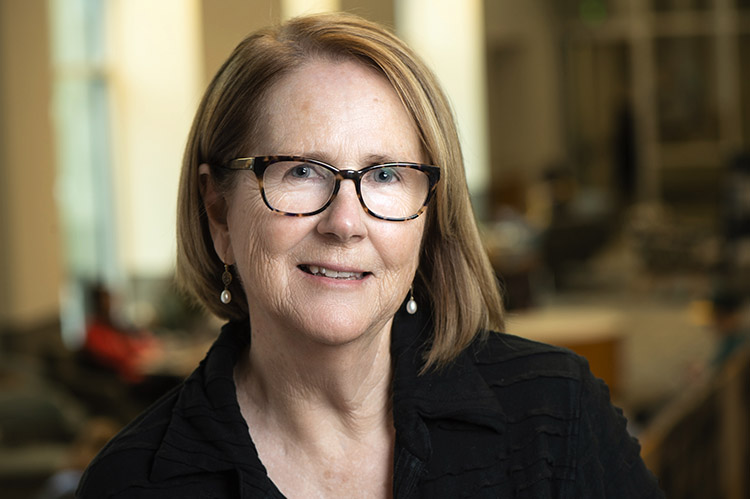
Academics specialize, and, increasingly, the more tightly focused the specialty is, the better. Who can command the literature in more than one specialty at a time? Professor Charlotte Witt, for one.
Professor Witt has established a world-class reputation in ancient philosophy, especially for her work on Aristotle, known for millennia for both his brilliance and his difficulty. Beginning with “A Mind of One’s Own: Feminist Essays on Reason and Objectivity,” co-edited with Louise Antony in 1992, Professor Witt also has carved out a world-class reputation as a feminist metaphysician, a leading voice in the field. That book has gone through subsequent editions and even celebrations of its seminal contribution, yet it only marks the beginning of Witt’s editorial curation of the field. Her 2011 book “The Metaphysics of Gender” weaves together issues in feminist theory, metaphysics, moral psychology, ethics and political philosophy; it has spawned conferences and symposia and will soon be followed by a new book further exploring the being of norms and their meaning for human identity. Professor Witt’s international reputation has enhanced the stature of UNH around the globe.
Professor Witt also has taught for decades in UNH’s interdisciplinary humanities program, covering art, literature, history and science, opening up the whole world of the intellect for her students, and modeling for them not merely the communication of information but a truly reflective engagement with fundamental questions. She also has loved her work fostering thesis students and colleagues; she is an honest interlocutor who provides searching and substantive criticisms while simultaneously supporting their efforts and helping them realize their potential as writers, scholars and persons.
Thus, Charlotte Witt is much more than a distinguished professor: she is a treasured colleague, mentor and friend. One student writes, “Charlotte has a particular knack for making impossible concepts easy to grasp — whether that means Aristotle or your own ability to finish 80 pages of cohesive writing. Her scholarship and friendship have formed me as a writer and human. I’m so grateful for her and how working with her made me a braver, smarter, and more careful person.” A colleague enumerates the qualities that make Charlotte Witt a mentor extraordinaire: “respect for the person, gentleness and empowerment, all which inspire trust. It is not only that Charlotte says the right things; her supportive attitude is conveyed implicitly in how she is with me and how she is with our colleagues.”
-
Compiled By:
Susan Dumais '88 '02G | College of Liberal Arts

















































